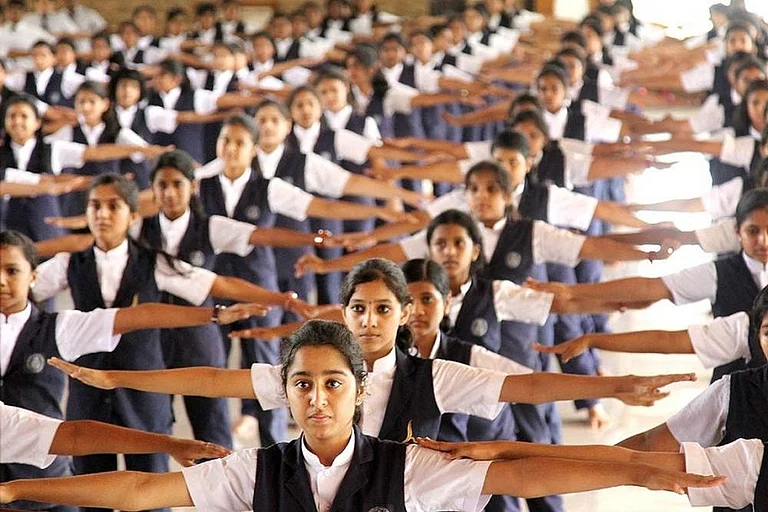In a country of institutionalised injustice, any policy attempt packaged as reform seems to automatically claim radical betterment for its constituency. The devil and the god in the details escape thorough scrutiny for long, sometimes long enough until the projectile path of next reform hits the constituency flush on its body-politic. The proposed Higher Education Council of India (Repeal of UGC) Act 2018 is one such case in point with a clear stamp of totalitarian political intent.
In the wake of a prevalent Brahmanical system of denying education and maintaining a fiefdom on knowledge, the constitutional obligation of the new nation was to democratise education by promoting public funded institutions. Over the last seven decades, this mandate has been diluted as democratisation and equal access to all in education remain distant and incomplete. The last three decades make tall perfunctory claims but, in reality, scuttle the goal by embracing free market fundamentalism that has promoted privatisation in education.
Contrary to the claims of academic rationale for introducing the reform, the MHRD note on HECI Act 2018 makes a Freudian slip when it says “Government, under the leadership of Prime Minister Narendra Modi has embarked a process of reform of the regulatory agencies for better administration of the higher education sector.” (highlights mine).
One could see that the HRD ministry’s proposal for HECI is deeply reminiscent of the colonial policy of aligning education with the demands of the ruling class mooted by Lord Curzon in early twentieth century. Both are attempts to wrest greater political control in higher education from where trenchant critiques of the political class in power are often made. The colonial reform of Curzon aimed at complete official control of education in India to rein in the emancipatory upsurge fomented by liberal education among the British colonial subjects. Likewise, the present government’s antipathy towards the students’ and teachers’ movements across the campuses which have exposed the hollowness of sabka saath, sabka vikas policy of the RSS ideology in power well known.
The seemingly mother-of-all reform is in fact a climb down from the HEERA (Higher Education Evaluation and Regulatory Authority) behemoth actively promoted by the PMO and Niti Aayog which tried to form a single body to oversee entire education (not political science). To be fair, UPA minister Kapil Sibal tried to do the same by advocating a National Council for Higher Education and Research (NCHER). To understand this equal fascination with centralised bodies for dispensations of divergent politics, we should realise how closely integrated we are into the Wold Trade Organisation regime which treats education as a tradeable service. In the neoliberal order of finance capitalism, education is not a right but a marketplace of profitable commerce. Education if accessed as a commodity will then not question but further the inequities and status quo of existing privileges of the dominant sections of the society. The recipe for education from these stables of entitlement is an overdose of accreditation and regulation instead of democratisation.
The rise of NAAC’s role in the last two decades, proposal for HEFA (Higher Education Funding Agency) are all precursors to the present HECI Act. HECI is purportedly claimed as a regulatory body to maintain academic standards with punitive powers. In effect, this move is providing cover for the great heist of financial autonomy from the apex body, UGC, which is not just a funding agency as it is claimed, that also maintains academic standards and regulates practices. HECI in one stroke has legislated funding as the exclusive domain of the government of the day thereby compromising academic freedom by making financial grant conditional to the pleasure of the government in power.
In a society that has historically experienced educational precarity, especially aggravated in the case of SC, ST, OBC, Minorities, Women and PWD, and still in dire need of revitalisation of infrastructure and systems in education, it is criminal to abandon input-oriented approach in favour of an outcome-based approach. The exclusive focus and privileging of ‘learning outcomes’ is a shorthand for favouring commoditisation and profiteering through privatised, capitation fee based, self-financing institutions.
The government wants to withdraw from the duty of providing more inputs/infrastructure in higher education by talking about public-private-personal partnership and what not, and yet tries to reap suitable outcomes or, maybe, credulous subservience from these spaces of critical thinking by having absolute administrative and financial control. HECI will pave way for higher student fees and greater curb on dissent and freedom of expression of individuals and institutions. Moreover, the social relevance of public funded institutions is disacknowledged in the Act favouring the scope for further privatisation of higher education. It is nothing but the government consolidating, centralising and monopolising power in academic matters while ensuring a free run for private capital through legislative subterfuges.
Most of the claims accompanying the new act are bogus and anti-people. For instance, when it claims to end Inspection Raj, it actually inaugurates Accreditation Raj. In envisioning it as overriding the specific acts of universities and the legislations of states, this Act unilaterally legislates on a concurrent subject thereby encroaching on the rights of the state governments and jeopardising constitutional federalism. The 14-member committee has minimal representation from teachers while being hand-picked by the government. It is indeed an irony that a government which has failed to make public the much-hyped New Education Policy is rushing along with this new Act. The charade around NEP exposed the intellectual poverty of the political Right that has continued to serve the diktats of global capital in government while claiming a variety atavistic nationalism as political credo.
Along with the memories of Curzon, this bill reprises in true BJP fashion the tremors already felt in Gujarat: Common Universities Ordnance (2004) during Modi’s chief minister-ship and the recently implemented Gujarat State Higher Education Council Act 2016 that conferred unbridled powers in academia in the hands of political leadership. Unfortunately, similarities don’t end there - if Curzon sprung his reform after a series of secret meetings in Simla (to which he admitted no Indian), the latest to roll out from MHRD is after a May 2018 meeting in another hill station Mussoorie. A century ago, the cool climes promulgated a divisive bill and subsequent reforms which ultimately led to Partition of Bengal in a couple of years’ time. Now it seems we are in for a lot of political heat as the HECI Act, by a government hell bent on pursuing a hierarchised notion of citizenship in politics and in education, in the proposed form will compromise the aspirations of the marginalised.
(The writer teaches English at Dyal Singh College, New Delhi and is an elected Academic Council member, University of Delhi. Views are personal)


























